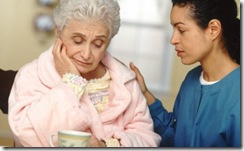 The words of the physical therapist whirled in Alicia’s head.
The words of the physical therapist whirled in Alicia’s head.
“Your mother is having some difficulty following directions. We are giving her verbal cues to help her stability, but she cannot remember them long enough to imbed them into her long-term memory.”
Alicia recently took her 83-year old mother home to care for her after a recent fall. While her mom was improving physically, she wasn’t the same as before the fall.
“It wasn’t anything I could put my finger on until the physical therapist made that comment,” Alicia said. “Then I started to put two and two together—the poor judgment Mom demonstrated that led to her fall and now this.”
A volunteer at an adult day care program for those with Alzheimer’s, Alicia is better equipped than most to see early signs of dementia.
So why didn’t she, of all people, recognize the signs?
According to a national survey just released, a quarter of all baby boomers can’t name a single early sign of Alzheimer’s disease. These include memory loss affecting daily living, difficulty performing routine tasks, communication problems, personality changes, loss of initiative, disorientation, poor judgment or mood swings.
 Camarillo-based clinical research psychologist Dr. Lisa J. Hayden notes, “For many folks the cognitive decline is slow and subtle. In hindsight, it’s easier to put things together and see the onset. The one exception to this is an acute situation, such as a stroke; (in that case) the onset is usually fairly abrupt and drastic.
Camarillo-based clinical research psychologist Dr. Lisa J. Hayden notes, “For many folks the cognitive decline is slow and subtle. In hindsight, it’s easier to put things together and see the onset. The one exception to this is an acute situation, such as a stroke; (in that case) the onset is usually fairly abrupt and drastic.
“There are a number of boomer children who do not recognize the signs of Alzheimer’s disease in their parents until much later in the disease process. When it’s someone you love and care about, it’s much more complicated. It’s hard for us to see this change. We may find alternate explanations that we’re more comfortable with and that don’t require us to have ‘the talk’ with our loved one.”
Alicia booked an appointment with her mother’s physician and decided to try a test before the visit.
One of the best-known dementia screening tests is the clock drawing test. Individuals are asked to draw a clock with the hands pointing to a specified time, for example 10 minutes to 11. The more distorted and inaccurate the drawings are, the more likely the person has dementia.
While the test may not be scientifically accurate or take into account factors such as education level, it can be useful on an individual basis.
Alicia’s mother drew a clock. She did not include the number 3; the number 7 was where the 6 should be, and she did not draw hands on the clock but instead put a check mark next to the numbers 10 and 11.
Doctors recommend visiting a specialist.
“I think it’s advantageous for folks to work with someone with advanced and specialized training, such as a neurologist, to get the most accurate diagnosis,” Hayden said. “It really is important to get that thorough evaluation, and part of that is ruling out every other factor that could be contributing to cognitive changes.”
The Alzheimer’s Association offers a list of the 10 warning signs for dementia and a doctor’s appointment checklist at the website www.alz.org.
The city of Westlake Village will host a presentation by Hayden, “Aging or Alzheimer’s?” from 9 to 11:30 a.m. Sat., Feb. 5 at Westlake Village City Hall Community Room. For reservations, call Senior Concerns at (805) 497-0189.
More ...